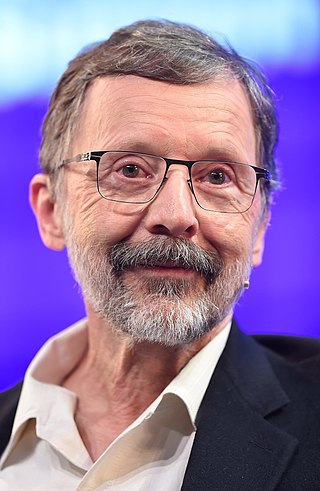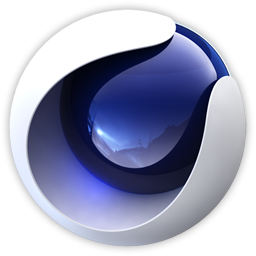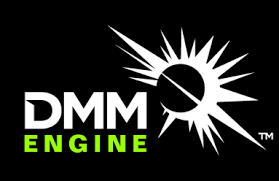
Computer animation is the process used for digitally generating animations. The more general term computer-generated imagery (CGI) encompasses both static scenes and dynamic images, while computer animation only refers to moving images. Modern computer animation usually uses 3D computer graphics to generate a three-dimensional picture. The target of the animation is sometimes the computer itself, while other times it is film.

Edwin Earl "Ed" Catmull is an American computer scientist who is the co-founder of Pixar and was the President of Walt Disney Animation Studios. He has been honored for his contributions to 3D computer graphics, including the 2019 ACM Turing Award.
Autodesk 3ds Max, formerly 3D Studio and 3D Studio Max, is a professional 3D computer graphics program for making 3D animations, models, games and images. It is developed and produced by Autodesk Media and Entertainment. It has modeling capabilities and a flexible plugin architecture and must be used on the Microsoft Windows platform. It is frequently used by video game developers, many TV commercial studios, and architectural visualization studios. It is also used for movie effects and movie pre-visualization. 3ds Max features shaders, dynamic simulation, particle systems, radiosity, normal map creation and rendering, global illumination, a customizable user interface, and its own scripting language.

Cinema 4D is a 3D software suite developed by the German company Maxon.

Houdini is a 3D animation software application developed by Toronto-based SideFX, who adapted it from the PRISMS suite of procedural generation software tools. The procedural tools are used to produce different effects such as complex reflections, animations and particles system. Some of its procedural features have been in existence since 1987.

Bryce, also often referred to colloquially as Bryce3D, is a 3D modeling, rendering and animation program specializing in fractal landscapes. The name is taken from Bryce Canyon—a rugged region with many of the same landscapes that were first simulated with the software.
Pixar RenderMan is proprietary photorealistic 3D rendering software produced by Pixar Animation Studios. Pixar uses RenderMan to render their in-house 3D animated movie productions and it is also available as a commercial product licensed to third parties. In 2015, a free non-commercial version of RenderMan became available.
Sony Pictures Animation Inc. is an American animation studio owned by Sony Entertainment's Sony Pictures Entertainment through their Motion Picture Group division and founded on May 9, 2002. The studio's films are distributed worldwide by Sony Pictures Releasing under their Columbia Pictures label, while all direct-to-video releases are released by Sony Pictures Home Entertainment.

Pixologic ZBrush is a digital sculpting tool that combines 3D/2.5D modeling, texturing and painting. It uses a proprietary "pixol" technology which stores lighting, color, material, orientation and depth information for the points making up all objects on the screen. The main difference between ZBrush and more traditional modeling packages is that it is more akin to traditional sculpting.

Nuke is a node-based digital compositing and visual effects application first developed by Digital Domain and used for television and film post-production. Nuke is available for Windows, macOS, and RHEL/CentOS Foundry has further developed the software since Nuke was sold in 2007.

Sony Pictures Imageworks Inc. is a Canadian visual effects and computer animation studio headquartered in Vancouver, British Columbia and Montréal, Québec, with an additional office on the Sony Pictures Studios lot in Culver City, California. SPI is a unit of Sony Pictures Entertainment's Motion Picture Group.

Vue is a software tool for world generation by e-on software with support for many visual effects, animations and various other features. The tool has been used in several feature-length movies.

3D computer graphics, sometimes called CGI, 3D-CGI or three-dimensional computer graphics, are graphics that use a three-dimensional representation of geometric data that is stored in the computer for the purposes of performing calculations and rendering digital images, usually 2D images but sometimes 3D images. The resulting images may be stored for viewing later or displayed in real time.

Digital Molecular Matter (DMM) is a proprietary middleware physics engine developed by Pixelux for generating realistic destruction and deformation effects. The offline version can support high-resolution simulations for use in film special effects. The real-time version is designed for video games, and other simulation needs by attempting to simulate physical real-world systems. Unlike traditional real-time simulation engines, which tend to be based on rigid body kinematics, the use of finite element analysis (FEA) allows DMM to simulate a large set of physical properties. Developers can assign physical properties to a given object or portion of an object, which allow the object to behave as it would in the real world. In addition, the properties of objects or parts of objects can be changed at runtime, allowing for additional interesting effects.
3D computer graphics software refers to programs used to create 3D computer-generated imagery.

Modo is a polygon and subdivision surface modeling, sculpting, 3D painting, animation and rendering package developed by Luxology, LLC, which is now merged with and known as Foundry. The program incorporates features such as n-gons and edge weighting, and runs on Microsoft Windows, Linux and macOS platforms.
Maxon Computer GmbH is a German software company that produces software solutions for content creators. The company’s product lines include the 3D software Cinema 4D, the Red Giant tools for editing, motion design and filmmaking, Redshift renderer and the digital sculpting and painting software ZBrush as well as the mobile sculpting app Forger. The company’s cross-platform benchmarking application Cinebench is used by developers, reviewers and users to evaluate hardware performance.
Arnold is a computer program for rendering three-dimensional, computer-generated scenes using unbiased, physically-based, Monte Carlo path tracing techniques. Created in Spain by Marcos Fajardo and later co-developed by his company Solid Angle SL and Sony Pictures Imageworks, Arnold is one of the most widely used photorealistic rendering systems in computer graphics worldwide, particularly in animation and VFX for film and TV. Notable feature films that have used Arnold include Monster House, Cloudy with a Chance of Meatballs, Alice in Wonderland, Thor, Captain America, X-Men: First Class, The Avengers, Space Pirate Captain Harlock, Elysium, Pacific Rim, Gravity, Guardians of the Galaxy, Star Wars: The Force Awakens, Arrival and Blade Runner 2049. Notable television series include Game of Thrones, Westworld, Trollhunters, LOVE DEATH + ROBOTS, Jelly Jamm and The Mandalorian.
CrazyTalk is Reallusion's brand name for its 2D animation software. The product series includes CrazyTalk, a 2D facial animation software tool, and CrazyTalk Animator, a face and body 2D animation suite.









